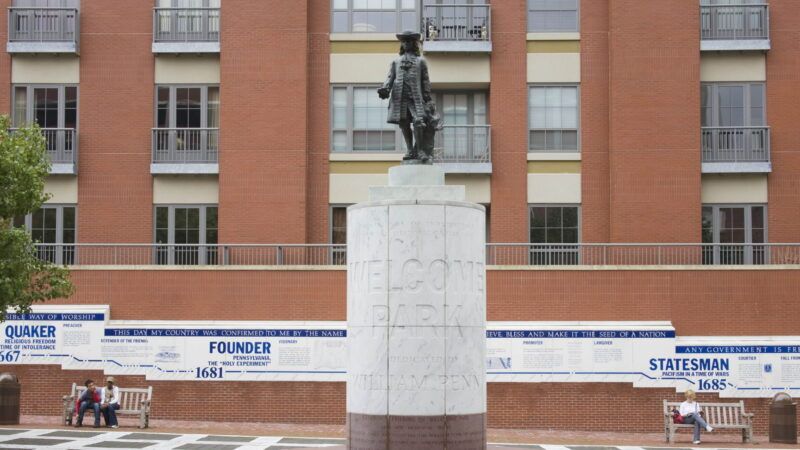William Penn Statue Reversal Shows Positive Power of Social Media
In an era when X (formerly Twitter) is blamed for all the ills of the world, here's a case where it did good.

Last Friday, January 5, the National Park Service (NPS) announced plans to permanently remove a statue of Pennsylvania founder William Penn and a replica of his home from Philadelphia's Welcome Park and replace them with "an expanded interpretation of the Native American history" in the region. NPS solicited public input on the park's "rehabilitation," but wasn't prepared for the response.
We need your input on Welcome Park rehabilitation! More info at: https://t.co/owkb3jxBIV pic.twitter.com/nh092m4S5W
— IndependenceNPS ???????? (@INDEPENDENCENHP) January 5, 2024
Just 72 hours later, NPS reversed course due to voluminous outrage voiced primarily on X, the social media site formerly known as Twitter. Among the many critics of the statue's removal was Pennsylvania's Democratic Gov. Josh Shapiro, who announced his "team has been in contact with the Biden Administration throughout the day to correct this decision. I'm pleased Welcome Park will remain the rightful home of this William Penn statue—right here in the Commonwealth of Pennsylvania Penn founded."
The speed with which NPS folded is remarkable, and one that harkens back to earlier moments when the internet was young and many of us (certainly me!) celebrated the awesome leveling power of what was then still called "new" media. Years before X/Twitter played a major role in relatively trivial controversies du jour such as Bill Cosby's failed comeback and Justin Trudeau's inane eulogy for Fidel Castro, the micro-blogging site was credited with launching "revolutions" in Moldova, Iran, Egypt, Tunisia, and elsewhere. As The Philadelphia Inquirer's wrote, "The [NPS] plan ended the same way it started: through a set of tweets."
I'm a fan of figurative and sometimes literal iconoclasm, so I've got no problem with tearing down statues for all sorts of reasons, including simply because tastes have changed. But pulling down William Penn was a particularly ill-conceived move. Almost alone among colonial founders, he treated Native Americans with precisely the sort of respect, grace, and love that should be celebrated rather than tossed into the dustbin of history. The treaty that he signed with local tribes in the 1680s helped secure peace until the 1750s, when the French and Indian War destabilized the region.
Penn was far from perfect (like other early Quakers, he owned slaves), but we should remember and celebrate radical, proto-liberal figures such as him and Roger Williams, the founder of Providence and the colony of Rhode Island and who also engaged local tribes with respect and dignity. We would have been a better country had we followed their leads more closely. And we will have a poorer future if we remove their presence—already faded, if not forgotten virtually completely—from our public places (Williams, alas, is the namesake of one of the lowest-ranked law schools in the country, a particularly ignoble fate for the former secretary to the great English jurist Edward Coke).
The past is filled with crimes, wars, and disasters that still mark us and bleed through into the present, staining the social fabric. But it is equally stuffed with examples of what we could have and should have done differently. In 1918, the literary critic Van Wyck Brooks issued a call to create a "usable past" that would help us both understand where we came from and where we might be headed. "The present is a void and [Americans float]… in that void because the past that survives in the common mind of the present is a past without living value," he wrote. "The past is an inexhaustible storehouse of apt attitudes and adaptable ideals; it opens of itself at the touch of desire; it yields up, now this treasure, now that, to anyone who comes to it armed with a capacity for personal choices."
The problem with the NPS's plan wasn't that it was trying to revise the past—we do that all the time, sometimes consciously and sometimes not—but in the specific decision to toss William Penn out on his ear. There is so much to learn from his beliefs, actions, and life—a radical pacifist who was also a champion of religious liberty at a time when that was dangerous, and a champion of honest and open commercial exchange—we would beggar ourselves by erasing him. There is surely enough space in Welcome Park and public discourse for Penn and Native Americans.
Thanks be to X on this score. At a time when social media is being attacked for causing or contributing to all the ills of the world, this controversy reminds us that technologies that disperse and decentralize communications can help create a more usable past by giving voice to present-day concerns.


Show Comments (45)